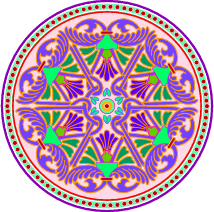|
The Temple
And it shall come to pass in the last days that the mountain of the house
of Hashem shall be
established at the top of the mountains, and shall be exalted above the hills; and all of the
nations shall flow unto it. And many people shall go and say, Come, and let us go up to
the mountain of the Lord, to the house of the God of Jacob; and He will teach us of His ways,
and we shall walk in His paths: for out of Zion shall go forth Torah, and the word of
God from Jerusalem. (Isaiah 2:2-3).
Plan of the Second Temple
Is is perhaps interesting to note that for some of these key word pairs,
the Torah text produces some of the smallest possible
ELS configurations. We lift the constraint on expected number of ELSs and search
for all ELSs. We show the resulting tables for each of the 10 possible pairs of
key words. The next table is the smallest possible configuration of Messiah and
Temple.
The cylinder size is 13,662 columns.
This is a smallest possible configuration. When the ELS skips has no upper limit,
the probability that a text from the ELS random placement text population would produce
such a smallest possible configuration is 7/100.
Finding by Professor Haralick
The cylinder size is 9,721 columns.
This is a smallest possible configuration. When the ELS skips has no upper limit,
the probability that a text from the ELS random placement text population would produce
such a smallest possible configuration is 3.5/100.
Finding by Professor Haralick
The cylinder size is 25,320 columns.
This is not a smallest possible configuration. When the ELS skips has no upper limit,
the probability that a text from the ELS random placement text population would produce
as small a configuration is 4/100.
Finding by Professor Haralick
The cylinder size is 1,240 columns.
This is not the smallest possible configuration. When the ELS skips has no upper limit,
the probability that a text from the ELS random placement text population would produce
as small a configuration is 23/100.
Finding by Professor Haralick
The cylinder size is 24,007 columns.
This is a smallest possible configuration. When the ELS skips has no upper limit,
the probability that a text from the ELS random placement text population would produce
such a smallest possible configuration is 5/100.
Finding by Professor Haralick
The cylinder size is 55,868 columns.
This is a smallest possible configuration. When the ELS skips has no upper limit,
the probability that a text from the ELS random placement text population would produce
such a smallest possible configuration is 36/100.
Finding by Professor Haralick
The cylinder size is 5,580 columns.
This is not the smallest possible configuration. When the ELS skips has no upper limit,
the probability that a text from the ELS random placement text population would produce
as small a configuration is 41/100.
Finding by Professor Haralick
The cylinder size is 10,257 columns.
This is a smallest possible configuration. When the ELS skips has no upper limit,
the probability that a text from the ELS random placement text population would produce
such a smallest possible configuration is 57/100.
Finding by Professor Haralick
Art Levitt found that the smallest possible configuration of Messiah and Son of David
does appear in the Torah text.
The cylinder size is 21,264 columns.
This is the smallest Possible Configurationhen the ELS skips has no upper limit,
the probability that a text from the ELS random placement text population would produce
such a smallest possible configuration is 1.5/100.
Finding by Art Levitt
The cylinder size is 3,638 columns.
This is not a smallest possible configuration. When the ELS skips has no upper limit,
the probability that a text from the ELS random placement text population would produce
such a smallest possible configuration is 53.5/100.
Finding by Professor Haralick
What may be interesting about these configurations obtained when there was no upper limit to
the expected number of ELSs, is that in each of the 10 key word pairs, there was a configuration
in which an ELS of each of the key words was an exact multiple of the cylinder size. For the
configuration to be a compact configuration, the placement of the ELSs also had to be constrained.
Given the complete set of ELSs for each of the key words, we examined the probability that each
of them would have happened by chance. From the p-levels found, we do infer that something
unexpected has happened even though it involves large numbers of ELSs.
As well we will attempt an analytic calculation to help determine whether the cause of
the effect is the resonance of the skips, meaning that there may be an unexpected large
number of ELSs of key word pairs that are resonant, or whether the effect is due to an
unexpected placement of the expected number of resonant ELS pairs.
< Previous >
< Next >
|














